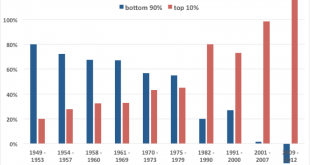By Pavlina R. Tcherneva The attacks on MMT are taking a comical turn. A recent one, courtesy of Noah Smith, takes aim at a paper I wrote in the 90s titled “Monopoly Money: The State as a Price Setter”. It focused on a key MMT idea—that the currency-issuing monopolist (just like any other monopolist) is a price setter. The economics that I was taught didn’t even consider the implications. So I wrote down a few equations to look at different scenarios of prices paid and real resources...
Read More »Tcherneva, Sawicky and Kaboub on MMT and policy
Pavlina Tcherneva: There is nothing more crippling to a bold policy agenda than the myth that the government can run out of money. This myth is behind every But how will you pay for it? objection to proposals such as a Green New Deal and Medicare for All. New House Majority Leader Nancy Pelosi (D-Calif.) has even proposed instituting self-defeating PAYGO (pay as you go) rules, which would require all new government spending to be matched with increased revenue, wrongly prioritizing the...
Read More »John Carney — The Problem with the ‘Job Guarantee’ Is Not That It’s Too Expensive. It’s That the Left Hates Us
John Carney makes interesting points pro and con. Most of the cons are about politicization of the program since the JG as it is being presented and supported is clearly a Democratic program and "leftist" idea. He points out that this needn't be so. A value-neutral JG program can also be designed to appeal cross the political spectrum. JG supporters should listen to this. A JG is really a populist program that favors people, and firms will oppose it. For, as Carney points out, employers...
Read More »Dylan Matthews — What America would look like if it guaranteed everyone a job
Imagine if a well-paying job, with benefits and a high enough salary to pay for rent, transportation, and food, were a human right. Imagine the US federal government established a policy whereby anyone who didn’t have a job and wanted one could go into a local office for a government agency — call it the Works Progress Administration — and walk out with a regular government position paying a livable wage ($15 an hour, perhaps) and offering health, dental, and vision insurance, and...
Read More »Inequality Update: Who Gains When Income Grows?
By Pavlina R. TchernevaBard College Growth in the US increasingly brings income inequality. A striking deterioration in this trend has occurred since the 80s, when economic recoveries delivered the vast majority of income growth to the wealthiest US households. This note updates my original inequality chart (reproduced below) with the latest data. For earlier discussions, see e.g., here, here, and here. Figure 1: bottom 90% vs. top 10%, 1949-2012 expansions (incl. capital gains) The...
Read More »THE ECONOMIC CONSEQUENCES OF DONALD TRUMP
Pavlina R. Tcherneva Economic consequences A lot has been said already. For me, this was the culmination of a decades-long process where the Democrats sold out their progressive agenda and happily embraced the Republican’s neoliberal economic policies. For some of the best analysis, see here, here, here and here. My own view is that the Democrats have not had an economic policy of their own for nearly half a century, just an ‘inferior’ version of what Republicans usually champion—tax cuts...
Read More »Fiscal Feminism: Pavlina R. Tcherneva
NEP’s Pavlina Tcherneva appears on the Laura Flanders Show. Pavlina says the current practice of gender-blind and race-blind fiscal policy lacks visions and helps no one. Congress, according to Pavlina is focusing on the wrong things. A self ascribed feminist economist, Pavlina says feminist fiscal policy is real, not simply ideological, and should be a central part of the American economy. We’ll encourage growth, she says, by creating employment — not the opposite. And employment begins...
Read More »NEP’s Pavlina Tcherneva on RT’s Boom and Bust
NEP’s Pavlina Tcherneva appears on RT’s Boom and Bust with Ameera David and continues her conversation with RT-TV explaining how the Job Guarantee program delivers the economic benefits that the Basic Income proposal only promises. She appears at 12 min and 55 seconds. [embedded content] Share this:
Read More »An Argument Against Basic Income
NEP’s Pavlina Tcherneva speaks with Bloomberg’s Joe Weisenthal about Basic Income Guarantees. You can view the segment here. Share this:
Read More »A Global Marshall Plan for Joblessness?
By Pavlina Tcherneva(Crossposted from INet) Global unemployment is expected to surpass 200 million people for the first time on record by the end of 2017, according a recent ILO study, and limitations of official statistics suggest that the problem is much larger . As conventional measures increasingly fail to produce tight labor markets and jobless recoveries become the norm, economists grapple with this new reality by calling it secular stagnation and by adjusting upwards the rates of...
Read More » Heterodox
Heterodox

